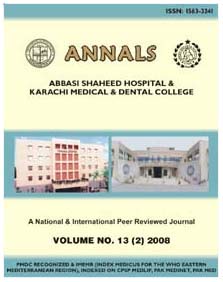
| |
| Home |
| Editorial Staff |
| Instruction to Authors |
| Journal-Issues |
| Policy |
| Copyright |
| KNOWLEDGE ATTITUDE PRACTICE REGARDING HEPATITIS B IN PARAMEDICAL STAFF OF ABBASI SHAHEED HOSPITAL
UZMA ASHIQ HUSSAIN, UMME AIMAN, MEHWISH SULTAN, NARJIS ABSTRACT Objectives: To assess the knowledge of Hepatitis B in paramedical staff of Abbasi Shaheed Hospital regarding the risk of transmission; to determine the preventive measures taken by the paramedical staff of Abbasi Shaheed Hospital; to estimate the percentage of vaccinated staff. Design: Knowledge, Attitude, Practice (K.A.P) Study. Setting: Paramedical staff Subject: A representative sample of paramedical staff was taken from Abbasi Shaheed Hospital . The sample comprise of 100 paramedics, with distribution of 40 males & 60 females from different wards & operation theatres. Measurements: Subjects answered a 27-item, questionnaire composed of 2-sub categories v.i.z knowledge about Hep.B, attitude & practice regarding Hep.B.Subjects were asked to endorse upon those choices which in their opinion best stated their knowledge, attitude & practice. Results: From the data analysis it is revealed that, out of 100 paramedical staff, 40 were male & 60 were females comprising O.T. technicians & nursing staff Most of them working in morning shift (82%), their average working experience is more than 10 yrs (64%). Their knowledge was adequate but their attitude & practice wasn`t satisfactory. Descripitves are shown: Table 1,2,3 & chart 1 shows frequencies of knowledge about Hep.B. Table4&5 and chart 2&3 shows frequencies of attitude & practice regarding Hep2B. Table 6, 7&8 shows association of knowledge with attitude and practice. Table 6 shows association between knowledge about complications of Hepatitis B & completely vaccinated staff (P value=0.002). Table 7 shows association between knowledge of preventive measures with use of gloves (P-Value=0.004). Table 8 shows association between completely vaccinated staff with staff who had their antibody titer checked (P-Value=0.000). Conclusion: From our result it has been concluded that the knowledge about Hep.B was adequate among paramedical staff of A.S.H but their attitude & practice regarding exposure to risk factors was significantly different from their knowledge.
|
For Full text contact to: |
